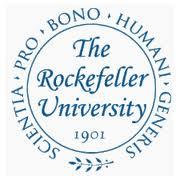The David Rockefeller Graduate Program
Ph.D. Program
Rockefeller’s Ph.D. program is based on the concept of learning science by doing science, and our laboratories are at the center of the Ph.D. training program. There are 74 laboratories at Rockefeller, each headed by a tenured or tenure-track member of the faculty, that study a wide range of biomedical and related sciences, including biochemistry, structural biology and chemistry; medical sciences and human genetics; molecular, cell and developmental biology; immunology, virology and microbiology; neuroscience; and physics and mathematical biology.
Students who arrive with a particular mentor or project in mind may immediately join a laboratory; those who prefer to explore may rotate through several laboratories to gain exposure to different areas of research. Students choose a laboratory by the end of their first year and present a thesis proposal before the end of their second year.
The collegial nature of the laboratory environment links younger students to previous generations from the same lab, as well as to postdocs and faculty mentors. The collaborations that result from these relationships are not only the basis on which our scientific education is built, they are the engine that drives the discovery process. Many collaborations produce exceptional results that lead to publication in prominent journals. And the relationships formed within laboratories often lead to lifelong associations.
While formal coursework is minimal, several classes each semester offer foundations in particular specialties, and three required courses taken during the first year serve to develop students’ abilities to critically interpret scientific data, to promote awareness of research ethics and to introduce students to research going on in the university’s labs. Beyond the scheduled curriculum, additional seminars and tutorials are available based on demand.
As graduate students near the end of their investigations, they defend their thesis before a panel of faculty members and present their work to the full Rockefeller University community.
Ph.D. Requirements
To earn the Ph.D. degree, a Rockefeller student must complete a thesis comprising a coherent body of novel scientific work. In consultation with the dean and research advisors, students must plan course work and tutorials to support and complement their thesis research. Students must balance their need for a broad basis of scientific knowledge with the requirements for greater depth of understanding in the particular area of science in which their thesis research will be focused. Students in the life sciences are required to participate actively in courses, discussions, and tutorials, and to fulfill designated qualifying requirements. Most courses are scheduled on a two-year cycle, during the fall, winter and spring quarters, but some are offered annually. Should a specialized course that is essential for a student's research be unavailable at the university, the Dean's Office may arrange for enrollment in a course at another institution. Students are encouraged to arrange tutorials with appropriate faculty members, if they feel the need.
Curriculum
There is no required core curriculum for the Ph.D. In consultation with the dean of graduate studies, students choose a flexible combination of courses totaling seven academic units. Courses are grouped into six major areas (biochemistry, structural and chemical biology and biophysics; cell, molecular and developmental biology; genetics; microbiology and immunology; neurosciences; physics and mathematical biology). Courses toward qualification should be relevant to the intended area of thesis research and completed by the end of the second year.
Contact
Office of Graduate Studies
The Rockefeller University
1230 York Avenue, Box 177
New York, NY 10065
phd@rockefeller.edu
212-327-8086
fax: 212-327-8505

